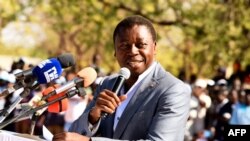Gnassingbe on Thursday gave his first interview since taking over reigns from his father in 2005, where he sat down with Togolese news outlet New World TV and said his nation is experiencing a spillover of the fight against jihadists in Burkina Faso and Mali.
The west African leader added that neighboring Benin, Ghana and Ivory Coast are experiencing similar effects.
“We have paid a heavy price, especially our defense and security forces, who have lost around 40 men unfortunately, and then we add civilian victims, a hundred or so civilian victims in the country,” Gnassingbe said, adding that foreign nationals account for half of the recorded deaths.
Gnassingbe described the campaign by the “terrorist organizations” as a “form of war.”
“What is happening to us is a form of aggression by two groups… one is called the Islamic State in the Greater Sahara and the other, the Group for the Support of Islam and Muslims,” he said, in reference to a group linked to al-Qaida.
In response to the jihadist attacks, Gnassingbe said his nation has a three-tiered strategy in place, among them is the Koundjoare military operation that started in September 2018.
“It was a preventative operation at first, which then became defensive, and now occasionally we are also on the offensive,” he said, adding that his government has also set up “an interministerial committee for the prevention and fight against violent extremism.”
The government committee was set up “to try and de-radicalize or prevent radicalization, because it is men, young people, who are being used to conduct these attacks,” said the 56-year-old leader.
Gnassingbe also spoke on his administrations position to remain silent when questioned by media about the frequently reported jihadist attacks.
“There is something indecent about proclaiming someone’s death,” he said.
“It is not because we don’t issue statements that we don’t have successes. We do have successes,” he added.
